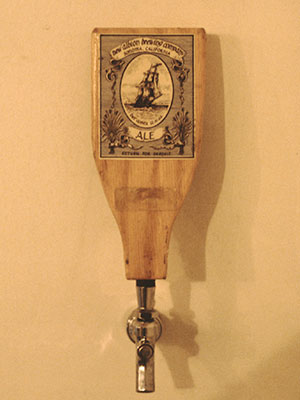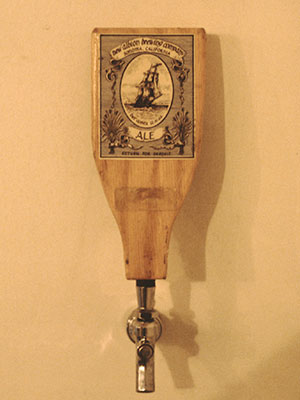A love of beer transformed Jack McAuliffe’s life, and likely yours too. In the 1960s, while serving in the navy in Scotland, McAuliffe cultivated a taste for British ales, especially porters and stouts. Back in California he began homebrewing, his hobby kindling a then-outlandish notion: Why not open a brewery?

No new American breweries had opened since Prohibition, and the 1970s brought closures and light lagers. McAuliffe saw not insurmountable hurdles but rather an opportunity to brew against the grain. In 1976, he partnered with Jane Zimmerman and Suzy Stern, pooled together a few thousand bucks, rented a shabby Sonoma, Calif., warehouse, and transformed former dairy equipment and 55-gallon Coca-Cola syrup drums into New Albion Brewing Company.
It became proof that a pint-size brewery—and outsize idea—could chart a flavorful new course for American beer. New Albion only produced its porter, stout, and pale ale for a half decade, closing in 1982, but the brewery’s resourcefulness, rule-breaking verve, and impactful ingredient choices remain bedrock principles of modern craft brewing.
“Jack was truly an American original,” says Jim Koch, founder and chief executive officer of Boston Beer Company, which began producing Samuel Adams Boston Lager in 1984. “Before him, starting a brewery from scratch was thought impossible. After him, 10,000 people have done it.”
McAuliffe, who died in July at age 80, created a lasting road map to opening a craft brewery, proving that a basement passion could become a viable profession. “He showed a path from homebrewing to commercial brewing,” says Ken Grossman, who toured New Albion in the late 1970s prior to opening Sierra Nevada Brewing in Chico, Calif., in 1980.
New Albion’s embrace of floral, piney, and grapefruit-like Cascade hops, a novel American cultivar disregarded by industrial lager brewers, helped “open the floodgates of hoppy, aromatic, bitter, but also very flavorful styles of beer,” Grossman says. Cascade hops took a starring role in Sierra Nevada’s landmark Pale Ale, first brewed in 1980 and still a standard-bearer today.
New Albion’s past created a precedent for the present. The brewery repurposed a former agricultural warehouse on Sonoma’s outskirts, and adaptive reuse of former factories, churches, banks, schools, and more remains at craft brewing’s brick-and-mortar core. After New Albion shut down, the founders of Hopland Brewery (later Mendocino Brewing Company) purchased the equipment to create California’s first brewpub. So began a long lineage of craft breweries buying old tanks and brew kettles to ferment fresh new recipes, showing no creative end to what’s feasible with malt, hops, yeast, and a desire to upend matters of taste.
There’s one last lesson to learn from McAuliffe. Craft brewing’s founders’ circle includes no lack of iconoclasts, self-promoters, fermentation savants, and contrarians. McAuliffe set a status quo-smashing standard. Maureen Ogle, historian and author of Ambitious Brew, has fond memories of sharing cold beers and warm conversations with McAuliffe.
“I roared with laughter at Jack’s razor-sharp takedown of this, that, and the other thing,” Ogle says. “He did not suffer fools gladly, if at all. And to the end, Jack was Jack: intelligent, a wicked ability to build anything, socially awkward, mostly bored by people, oozing sarcasm. Hilarious. And according to him, everything was a Communist plot. He was a joy to know.”
To celebrate the life and legacy of McAuliffe and New Albion, we have a simple suggestion: Grab some friends and go tip back pints at a local craft brewery. Hold tight what you hold dear.
The post Celebrating the Life of Jack McAuliffe appeared first on CraftBeer.com.
